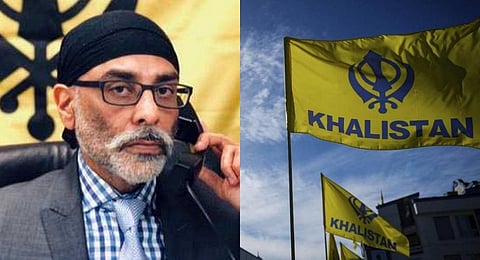Indian diaspora panel in US seeks to include extremist Gurpatwant Pannun and SFJ on no-fly list
WASHINGTON: A diaspora panel in the US has sought to include designated terrorist Gurpatwant Singh Pannun and his banned organisation Sikhs For Justice (SFJ) on the no-fly list for issuing video messages threatening people flying Air India.
Participants of a panel discussion "Indians in Canada under Threat of Terror and Hate Crimes', organised by the Foundation for India and Indian Diaspora Studies (FIIDS), a group of Indian-Americans and Indo-Canadians, asserted that it's time for the governments to take strong action against the separatist Sikh leader from the SFJ.
The SFJ is a US-based organisation banned by the Government of India under the Unlawful Activities (Prevention) Act (UAPA) for its anti-India activities.
In July 2020, Pannun was also declared an "individual terrorist" under the UAPA for promoting secessionism and allegedly encouraging Punjabi Sikh youth to take up arms.
"Canadian Prime Minister Justin Trudeau has misrepresented freedom of expression for freedom of terror and his allegations against India for the killing of extremist Niggar stirred anti-Indian and anti-Hindu crimes in Canada," said FIIDS Khanderao Kand.
"His policies seem to be ignoring the threats of extremism which will ultimately adversely impact Canada," he said.
"The panellists questioned why Gurpatwant Pannu and members of SFJ are not on the no-fly list for his threats to travel by Air India, alluding to the 1985 Air India 'Kanishka' bombing," Kand said in a statement.
Observing that historical seeds of hatred were sown by both the British and the Congress Party among Hindus and Sikhs, California-based Sukhi Chahal said the Sikh for Justice did not represent Sikhs as a whole and propagated a distorted and hateful narrative against Hindus and Sikhs.
Chahal urged collective responsibility to dismantle this narrative, engage with the silent Sikh community, and recognise that many Sikhs have fallen victim to the influence of fake Khalistanis who are well-funded and supported by Western states.
Ruchi Walia from Canada mentioned the importance of the unity of Hindus and Sikhs, which personifies her own personal story and mission.
Walia expressed concern about the radicalisation of young Sikh individuals through the dissemination of incorrect historical information which needs to be corrected.
Vijay Jain, spokesperson of Canadian Hindus for Harmony, emphasised the radicals are smaller but loud, suppressing moderate voices, and threatening peace and harmony.
He stressed the importance of community and political-level engagement.
Mohan Sonti, a FIIDS analyst, said the current threats to Indians in Canada, particularly from Khalistani terrorists, originated approximately 45 years ago with Pierre Trudeau, the former Prime Minister of Canada and the father of the current premier.
Sonti claimed that Pierre Trudeau's complacency contributed to the growth of Khalistani terrorism, citing the 1985 Kanishka bombing.
The 1985 Kanishka Air India bombing, one of the largest aviation terrorist attacks at the time, saw Boeing 747 -- named after the Emperor Kanishka -- exploding off the Irish coast, killing all 329 people on board.
The Canada to India via London flight was bombed by a Sikh separatist group in revenge for the 1984 storming of the Golden Temple.
Sonti accused subsequent Canadian governments of nurturing and supporting the immigration of Khalistani terrorists, turning it into a significant issue.
Sonti claimed that this support continued to the present day, with prime minister Trudeau openly aligning with Khalistani elements, and criticised Canada for harbouring Khalistani terrorists.

